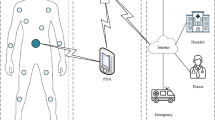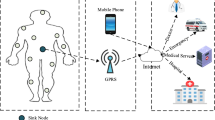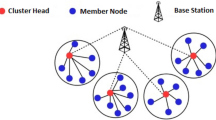Abstract
Power control means to adjust transmission power of mobile nodes. Ad-hoc wireless networks will be employed in situations where the communicating nodes will not have access to wired power such as an electricity grid. These nodes vary in size, but many will be small units and thus will have very limited energy cells and energy scavenging abilities. In this paper neural base power control improves energy consumption and throughput.
Similar content being viewed by others
References
Acharya, T., Chattopadhyay, S., & Roy, R. (2007). Multiple disjoint power aware minimum connected dominating sets for efficient routing in wireless ad-hoc network. In Proceedings of IEEE Conference on Information and Communication Technology. International Conference (pp. 336–340). March 7–9.
Chen, Y., Yu, G., Qiu, P., & Zhang, Z. (2006). Power aware cooperative relay selection strategies in wireless ad-hoc networks. In Proceedings of IEEE International Symposium on Personal, Indoor and Mobile Radio Communications (pp. 1–5).
Chou, Z.-T. (2007). Optimal adaptive power management protocols for asynchronous wireless ad-hoc networks. In Proceedings of IEEE Conference on Wireless Communications and Networking (pp. 61–65). March 11–15.
Colbourn, C. J., Cui, M., Lloyd, E. L. & Syrotiuk, V. R. (2008). A carrier sense multiple access protocol with power packoff (CSMA/PB). 5(8), 1233–1250 on line (http://www.sciencedirect.com) paper, August.
ElBatt T., Ephremides A. (2004) Joint scheduling and power control for wireless ad-hoc networks. IEEE Transactions on wireless communications 3: 74–85
Guo S., Yang O. (2006) Minimum-energy multicast in wireless ad-hoc networks with adaptive antennas: MILP formulations and heuristic algorithms. IEEE Transactions on Mobile Computing 5: 333–346
Gomez J., Campbell A. T. (2007) Variable-range transmission power control in wireless ad-hoc networks. IEEE Transactions on Mobile Computing 6: 87–99
Krunz M., Muqattash A., Lee S.-J. (2004) Transmission power control in wireless ad-hoc networks: Challenges, solutions and open issues. IEEE Journal, Networks 18: 8–14
Kawadia V., Kumar P. R. (2005) Principles and protocols for power control in wireless ad-hoc networks. IEEE Journal, Selected Areas in Communications 23: 76–88
Kim T.-S., Kim S.-L. (2005) Random power control in wireless ad-ho networks. IEEE journal, Communications Letters 9: 1046–1048
Kao J. C., Marculescu R. (2007) Minimizing eavesdropping risk by transmission power control in multihop wireless networks. IEEE Transactions on Computers 56: 1009–1023
Kumar, G. & Thyagarajah, P. (2008). Power aware transport protocol for ad-hoc networks. In Proceedings of International Conference on Emerging Trends in Engineering and Technology (pp. 182–86). July 16–18.
Lee S.-H., Choi E., Cho D.-H. (2005) Timer-based broadcasting for power aware routing in power-controlled wireless ad-hoc networks. IEEE journal, Communications Letters 9: 222–224
Lee J. W., Mazumdar R. R., Shroff N. B. (2007) Joint opportunistic power scheduling and end-to-end rate control for wireless ad-hoc networks. IEEE Transactions on Vehicular Technology 56: 801–809
Li-Shan, S., & Xiao-Jun, Z. (2005). A power-saving routing algorithm based on ant algorithm in mobile ad-hoc networks. In Proceedings of International Conference on Wireless Communications, Networking and Mobile Computing (Vol. 2, pp.753–756). September 23–26.
Liang C., Dandekar K. (2007) Power management in MIMO ad-hoc networks: A game-theoretic approach. IEEE Transactions on Wireless Communications 6: 1164–1170
Long C., Zhang Q., Li B., Yang H., Guan X. (2007) Non-cooperative power control for wireless ad-hoc networks with repeated games. IEEE Journal on Selected Areas in Communication 25(6): 1101–1112
Muqattash A., Krunz M. (2005) POWMAC: A single channel power control protocol for throughput enhancement in wireless ad-hoc networks. IEEE Journal, Selected Areas in Communications 23: 1067–1084
Perkins C. E. (2002) Ad-hoc networking. Addison-Wesley, Reading
Pimentel, H. Pd. B., Martins, J. A., & Fundacao, C. (2007). Ad-hoc network performance dynamics—a study. In Proceedings of International Symposium on Wireless Pervasive Computing. Febraury 5–7.
Ruffini, M., & Reumerman, H. (2005). Power-rate adaptation in high-mobility distributed ad-hoc wireless networks. In Proceedings of IEEE Vehicular Technology Conference (Vol. 4). May–June.
Sridhar A., Ephremides A. (2008) Energy optimization in wireless broad-casting through power control. IEEE Transactions on Ad-hoc Networks 6(2): 155–167
Sartini, I., Mulas, G., Bonet, G., Moretti, L., & Colettiti, L. (2004). Power saving ad-hoc: A MAC protocol for multihop wireless ad-hoc networks. In Proceedings of Vehicular Technology Conference (Vol. 3, pp. 1603–1606). May 17–19.
Toh C.-K. (2002) Ad-hoc mobile wireless networks: Protocols and systems. Prentice-Hall, Englewood Cliffs
Wu, X., Wang, X. & Liu, R. (2008). Solving minimum power broadcast problem in wireless ad-hoc networks using genetic algorithm. In Proceedings of Conference on Communication Networks and Services Research (pp. 203–207). May 8.
Zawodniok, M., & Jagannathan, S. (2004). A distributed power control MAC protocol for wireless ad-hoc networks. In Proceedings of IEEE Wireless Communications and Networking Conference (Vol. 3, pp. 1915–1920). March 21–25.
Zheng, R., & Kravets, R. (2003). On-demand power management for ad-hoc networks. In Proceedings of IEEE Infocom, year.
Zheng, V. W., Zhang, X., Liu, D. & Sung, D. K. (2007). A joint power control, link scheduling and rate control algorithm for wireless ad-hoc networks. In Proceedings of IEEE Conference on Wireless Communications and Networking (pp. 3636–3640). March 11–15.
Zhitang, L., Jun, F., Wei, N., Li, W. & Yuan, H. (2007). A novel MAC protocol for wireless ad-hoc networks with power control. In Proceedings of IEEE international conference on Multimedia and Ubiquitous Engineering (pp. 347–352). April.
Zhu J., Qiao C., Wang X. (2006) On accurate energy consumption models for wireless ad-hoc networks. IEEE Transactions on Wireless Communications 5: 3077–3086
Author information
Authors and Affiliations
Corresponding author
Rights and permissions
About this article
Cite this article
Singh, V.P., Kumar, K. Literature Survey on Power Control Algorithms for Mobile Ad-hoc Network. Wireless Pers Commun 60, 679–685 (2011). https://doi.org/10.1007/s11277-010-9967-x
Published:
Issue Date:
DOI: https://doi.org/10.1007/s11277-010-9967-x




